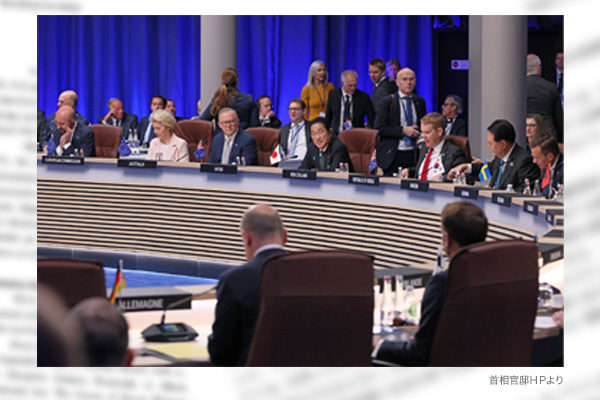Prime Minister Fumio Kishida’s enthusiasm for the North Atlantic Treaty Organization (NATO) stands out. As the leader of Japan, a partner country of NATO, Kishida participated in the NATO summit held in Vilnius, the capital of Lithuania, last week. He announced a Group of Seven (G7) joint declaration as the G7 chair, which stated that each G7 member would actively provide military and other supports to Ukraine, which is fighting a war with Russia, until Ukraine is admitted to NATO.
Even when Kishida assumes such a prominent role on the international stage, however, Japan cannot provide weapons to Ukraine at present due to domestic constraints. I am afraid that Japan’s military support may end up as an empty promise, leading Japan to lose international credibility.
Defense spending at 2% of GDP is outdated
The NATO summit confirmed its policy of allowing Ukraine to accede to NATO in the future, but failed to specify the timing and conditions for the accession. The failure apparently reflects U.S. President Joe Biden’s fear that Ukraine’s accession could lead to an all-out war between NATO and Russia.
To guarantee Ukraine’s security before its accession to NATO, the G7 pledged long-term military support to Ukraine through the provision of modern weapons, training of Ukrainian armed forces, information sharing and other means. Six G7 countries, excluding Japan, are also NATO members. On behalf of the G7, Kishida called on countries around the world to support Ukraine along with the G7.
In Japan, however, the ruling Liberal Democratic Party and its junior coalition partner Komeito party have just failed to reach agreement on easing restrictions on arms exports, postponing the conclusion until autumn or later. If Japan fails to act while encouraging other countries to take part in military aid to Ukraine, it will only be scorned by the international community.
Japan’s attempt to align itself with NATO is not limited to the Ukraine issue. Japan’s National Security Strategy, which was approved by the cabinet late last year, decided to raise the defense spending to 2% of its gross domestic product (GDP) in five years, adopting the figure NATO has advocated for years.
However, Russia’s invasion of Ukraine in February last year dramatically deteriorated the security environment in Europe. The NATO summit in Vilnius redefined the 2% as a “minimum” and made clear the spending more than 2% of GDP would be necessary.
Japan also cannot be complacent with the 2%. While Europe’s security is threatened only by Russia, Japan is exposed to nuclear and other military threats from China, North Korea and Russia. Japan is required to increase defense spending further to enhance its deterrence.
Is Japan prepared to be tied with NATO?
NATO’s plan to establish a liaison office in Tokyo, if implemented, may also deepen cooperation between Japan and NATO. Although the plan has failed to be realized due to French opposition, Japan seems to have been positive about the idea. However, NATO is a strict military alliance in which all members are obliged to defend any member country under foreign attacks. How aware is Japan of the seriousness of being strongly tied to that military alliance?
Could it be that Kishida is determined to use the strengthening of cooperation with NATO as a lever to further raise Japanese people’s national defense awareness and to hold a national referendum on constitutional amendment by September next year, when his first term as LDP president ends? The prime minister may be a surprisingly shrewd politician.
Yasushi Tomiyama is a senior research fellow and Planning Committee member at the Japan Institute for National Fundamentals and a former foreign news editor and bureau chief in Washington, D.C., London, and Bangkok for the Jiji Press.


